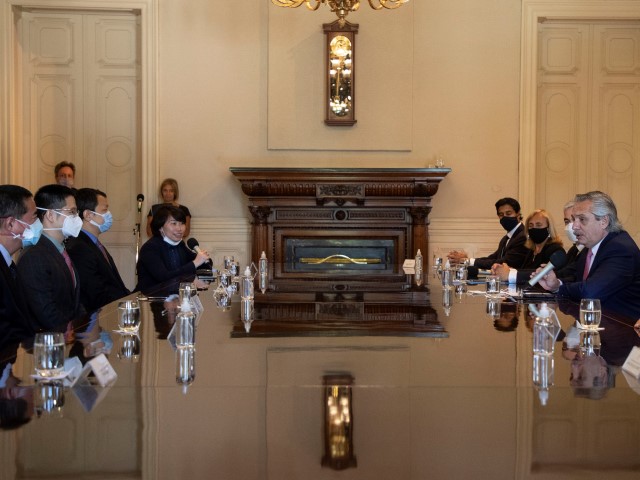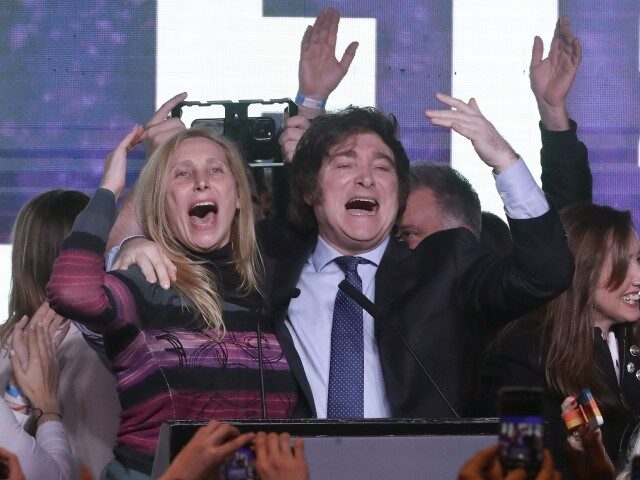Argentine libertarian economist Javier Milei won Sunday’s nationwide presidential primary with roughly 30 percent of the votes, setting the stage for the upcoming October 2023 general election with him as frontrunner.
Milei and his La Libertad Avanza (“Liberty Advances”) coalition will face off against Patricia Bullrich from the Juntos por el Cambio (“Together for Change”) center-right coalition and current Argentine Economy Minister Sergio Massa of the ruling leftist Frente de Todos (“Front for All”) coalition.
Argentina’s electoral law states that a candidate needs to obtain either more than 45 percent of the votes cast or more than 40 percent and have a difference of more than ten percent ahead of the second place candidate to become elected president of Argentina in the upcoming October 22 election — otherwise, a runoff election between the two most voted candidates will take place on November 19.
Sunday’s election, known as PASO (Simultaneous and Mandatory Open Primaries), was a mandatory nationwide process that determines all candidates for presidential, legislative, and regional governor electoral ballots. To be on the general election ballot, candidates must obtain at least 1.5 percent of the votes cast.
With a little over 97 percent of all votes tallied at press time on Monday, Milei obtained 30.04 percent, followed by Massa with 21.4 percent, and Bullrich with 16.98 percent. This is Massa’s second attempt at winning the presidency; he first ran in 2015 under the Unidos por una Nueva Alternativa (“United for a New Alternative”) coalition. Massa ended in third place with only 21.39 percent of the votes during the first round of the 2015 election.
Milei celebrated the primary’s results in his campaign bunker late on Sunday with a roughly 18-minute speech while accompanied by his vice presidential running mate Victoria Villarruel and members of his campaign team. Milei thanked his sympathizers and declared that his political coalition will not only put an end to “Kirchnerism” (a radical Marxist political movement in Argentina led by former presidents Néstor Kirchner and Cristina Fernández de Kirchner) but that it will also put an end to the “parasitic, scummy, and useless [political] caste” in Argentina.
“We are facing the end of the caste model, based on that atrocity that says that where there is a need, there is a right, but forgets that this right has to be paid for,” Milei said.
“Today we took the first step in rebuilding Argentina, and all of this manifests in a set of achievements and metrics on today’s election,” he continued. “We have not only been the most elected force in individual terms, but today we are the most voted force. Because we are the true opposition!”
The now-presidential frontrunner continued his speech by asserting that Argentina’s problem is that “the solution is in the hands of the problem, It is in the hands of the politicians.”
“If they don’t want to change, let’s get them out for good!” he shouted. “Now it’s time to celebrate with the campaigners, let’s all celebrate! The explosion is coming!”
The upcoming October presidential election will occur as Argentina, under current leftist President Alberto Fernández, faces a severe economic situation and mounting social distress fueled by over 122-percent annual inflation rates, a crumbling currency, and a dire shortage of foreign reserves. Argentina’s misfortunes have allowed communist China to exert pressure and take control of some of Argentina’s key strategic sectors under Alberto Fernández.

Signing ceremony of railway construction cooperation agreements between China and Argentina in Buenos Aires, Argentina, Dec. 11, 2020. Contracts worth some 4.7 billion U.S. dollars represent “extremely important investments,” Argentine Minister of Transport Mario Meoni said. Companies involved include China Railway Construction Corporation CRCC, China Machinery Engineering Corporation, CRRC Corporation Limited and Yutong. (Xinhua/Martin Zabala via Getty Images)
Massa, the left-wing candidate in October’s election, is spearheading the current government’s efforts to renegotiate over $40 billion in debt to the International Monetary Fund (IMF), which Argentina began to pay in Chinese yuan rather than U.S. dollars in July.
Milei, a fierce anti-communist, has denounced the ideology as a “murderous system” and described socialism as a “disease of the soul.” In 2021, Milei stated that he would break relations with China, explaining that he “doesn’t do business with communists.”
Milei’s government proposals include making sweeping changes to Argentina’s government system, a country that has been predominantly leftist-ruled for decades. Milei has promised a sharp cut in public spending, a significant streamlining of the executive’s cabinet of ministers, the elimination of the Argentine Central Bank, and discarding the crumbling Argentine peso and adopting the U.S. dollar as Argentina’s legal tender. The last policy is known in the region as “dollarization” and has been implemented in Ecuador, El Salvador, and Panama.
Milei has also promised policies to protect unborn children after Argentina legalized abortion in 2020 and vowed to repeal Argentina’s current mandatory “Comprehensive Sexual Education Program” (ESI) gender ideology program in schools.
Fernández, the current president, asserted that the PASO vote represents “the voice of our people” in remarks on Sunday.
“Now begins the real campaign in favor of democracy and the rights of the people,” Fernández said in a message posted on social media. “We are going to continue united, defending the homeland and work, taking care of people’s rights.”
Fernández, despite being eligible for reelection, chose not to run in April. The Argentine president’s decision left the ruling leftist Frente de Todos coalition in disarray, resulting in Massa presenting himself as its candidate. Shortly after the president’s announcement, Fernández insisted that his “concern is that the right wing does not govern Argentina again.”
Argentina’s current vice president and former two-term President Cristina Fernández de Kirchner (no relation to the current president) was poised to be the coalition’s candidate but announced in December that she would not be “a candidate for anything” and that her name “will not be on any ballot” after an Argentine federal court sentenced her to six years in prison for corruption. Fernández de Kirchner is unlikely to serve any prison time, as she presently enjoys double immunity due to her positions as vice president and head of the nation’s Senate.
Christian K. Caruzo is a Venezuelan writer and documents life under socialism. You can follow him on Twitter here.

COMMENTS
Please let us know if you're having issues with commenting.